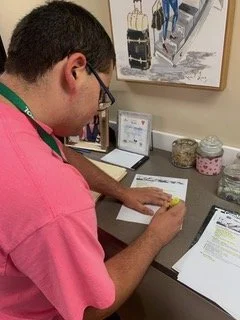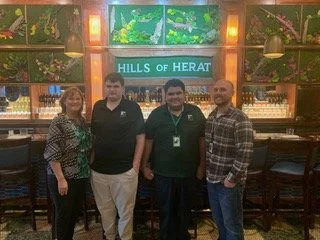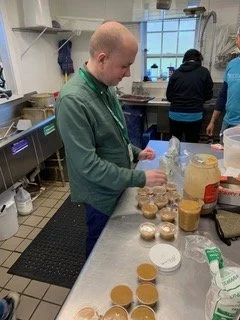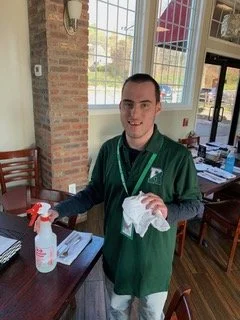Post-Graduate Years
What is the Ridge High School Post-Grad Program?
According to New Jersey regulations, students with disabilities have the right to be in school until they turn 21 years old. Ridge High School provides a Post-Grad program for students with disabilities. These students walk at graduation with their class but remain at Ridge until the year that they turn 21.
This program is called "Work-Based Learning" which is part of the post grad/transition program at Ridge High School. This program provides essential training for our students to learn skills in the workforce and it brings school and community together. There are currently 24 local companies participating (see list below). The purpose of the program is for students to acquire the necessary job skills in order to be able to obtain employment with a competitive wage once they leave school at 21. The majority of the post-graduate students at Ridge participate in the Work-Based Learning program.
Please Support Our WBL Program Sponsors Where Our Students Currently Work
YMCA • Bernards Township Library • Bernards Township DPW • Bernards Township Town Hall (various seasonal projects) • ShopRite • Walgreens • CVS • Priscilla’s Pantry • Brush’s Deli • Soup Shoppe • Monterey Fine Foods • Burger King • Chianti Pizza • Hills of Herat • Tons of Toys • Ridge Oak Senior Living • Travel Magic • Country Mile Gardens • Somerset Animal Hospital • Well-Bred Pet Store • Liberty Corner Presbyterian Church • Shrine of St. Joseph’s • Zarephath Christian Church • Riverwalk Pharmacy • Soup Shoppe • Washington House • Lord Stirling Stable • Raritan Headwaters
Thank You to Our WBL Sponsors
•
Thank You to Our WBL Sponsors
•
Thank You to Our WBL Sponsors
•
Thank You to Our WBL Sponsors
•
Thank You to Our WBL Sponsors • Thank You to Our WBL Sponsors • Thank You to Our WBL Sponsors • Thank You to Our WBL Sponsors •
What is Work-Based Learning?
Work-Based Learning (WBL) means experiential, supervised, in-depth learning experiences that are designed to offer students the opportunity to more fully explore career interests within one or more of the Career Clusters.
To be successful in Work-Based Learning, some students with disabilities need additional onsite support and supervision beyond what is typically provided. The students who often have more significant disabilities, can experience successful Work-Based Learning if additional trained staff, known as job coaches, are used as a supplement to typically available supports.
What are the benefits for students who participate?
Students who participate in Work-Based Learning can benefit by having the opportunity to:
Identify career interests, skills, and abilities
Explore career goals
Identify on-the-job support needs
Develop employability skills and good work habits
Build self-esteem
Gain an understanding of employer expectations
Develop an understanding of the link between academics and work
Gain work experience, generally connected to a specific job function
Develop an understanding of the workplace and the connection between learning and earning
Build a resume
What are characteristics of the WBL program?
Quality Work-Based Learning characteristics are as follows:
Clear roles and responsibilities for students, worksite supervisors, mentors, teachers, support personnel, and other partners such as parents
Training plans that specify learning goals tailored to individual students with specific outcomes connected to student learning
Collaboration among students, schools, and employers
On-the-job learning
Mentor(s) at the worksite
Clear expectations and feedback to assess progress toward achieving goals
What is the student’s responsibility in the WBL program?
Perform job responsibilities
Comply with expectations for job performance, behavior, and social interactions
Communicate needs and suggest support strategies (if applicable)
Follow-through on commitments
Adhere to workplace guidelines and procedures
Show respect and be responsible
Learn as much as possible about the work environment and the job
Reflect on the experience and work towards developing their career goals




